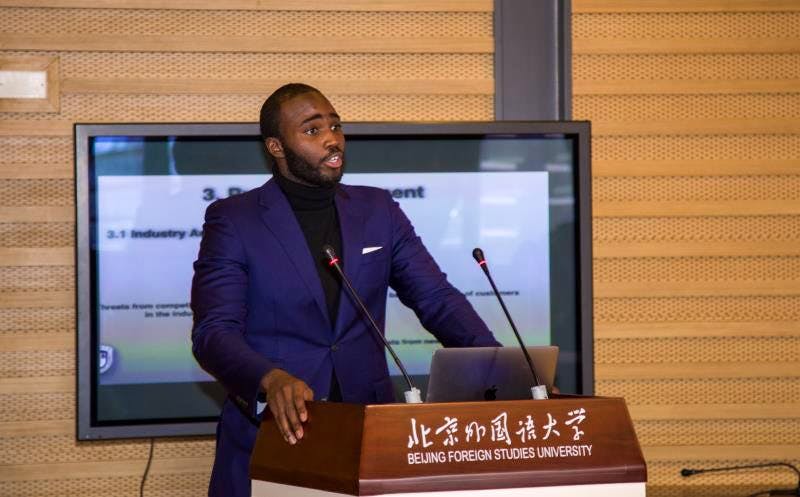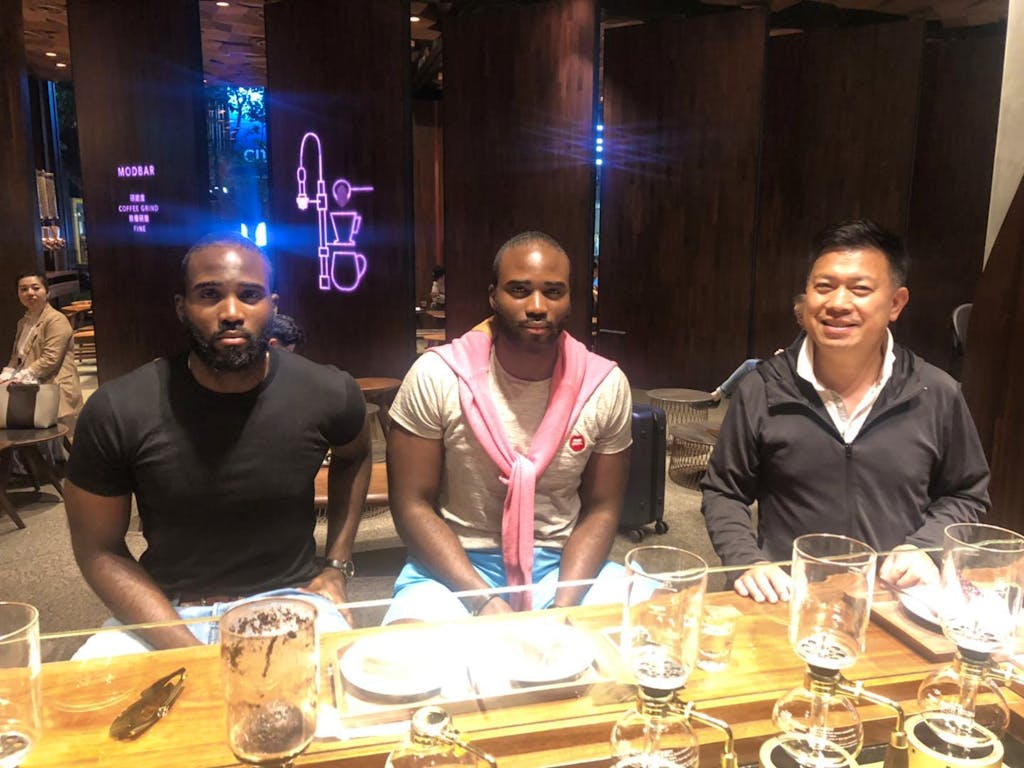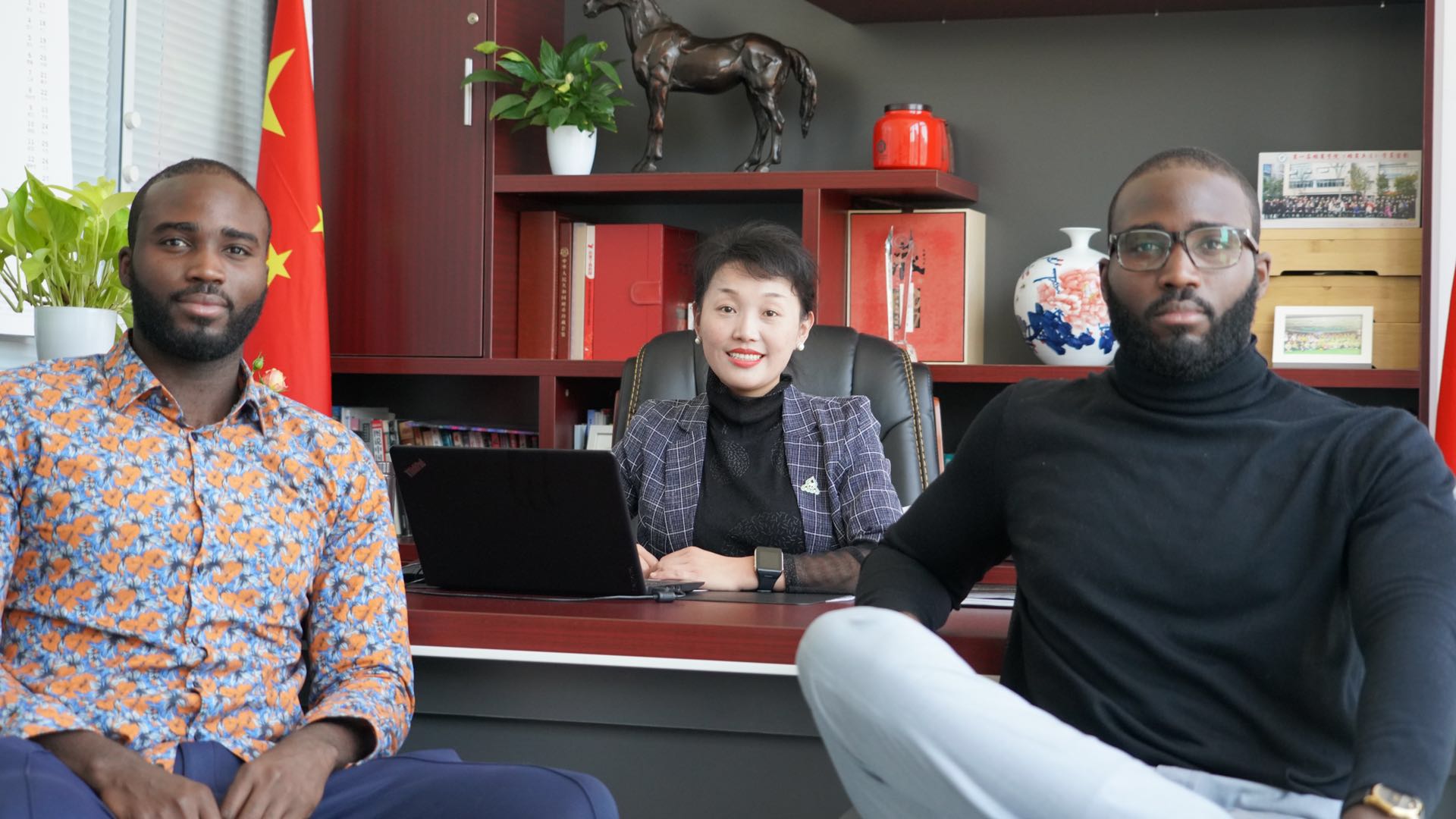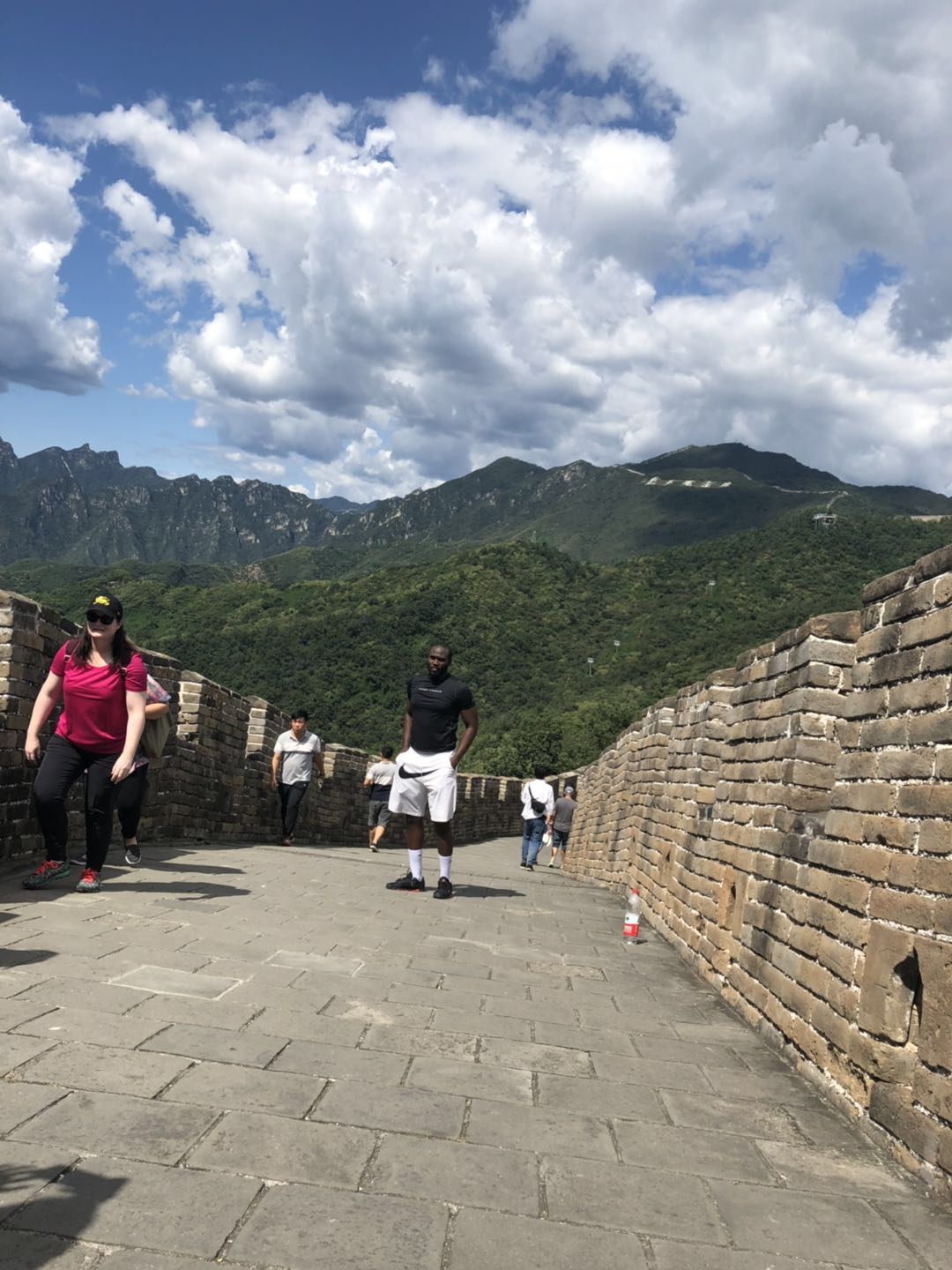Joey and Joel were working full-time in reputable companies in Canada. Joel was in a big insurance company, and Joey was employed in a well-known bank. In fact, just before they decided to leave the stable corporate world in Canada, Joey got a promotion and Joel got a decent pay rise!
But the brothers and twins knew from head on that they would have to take a big leap of risk some day. Joey and Joel quit their high-paying jobs and ventured to a new life in China, much to the shock of their mother and friends. They pursued higher education in BFSU and fully immersed themselves in the new culture.
The experience didn’t come without setbacks! Find out how Joey and Joel pushed through after almost quitting, how they are continuously working to encourage naysayers to visit China and why being in BFSU and Beijing has been the greatest decision of their lives!

Saina: Hello Joel and Joey, can you please introduce yourselves?
Joey: I’ll start first, so my name is Joey Samoa, from Canada but I have roots from West Africa Ghana. Last year in September, I decided to pursue my quest for an education in China. Simply because of what’s going on politically and economically so in a mash-up, this is pretty much I guess my decision to further my education here in Beijing.
Saina: What about you Joel?
Joel: I’m pretty much in the same boat. My name is Joel, I moved here in September 2018, with the focus of learning Chinese and learning how to talk Chinese and kind of understanding the culture and learning how to do business as well.
I was born in Canada but lived for 14 years in Ghana. I’ve been to two different countries and lived in two different countries, so it’s kind of nice living in China as well but I guess the main focus has been to learn the language and immerse myself into the culture and learn the way Chinese do things, especially in terms of business.
Saina: What about your experiences? How is it like living in China?
Joel: I think it’s quite conventional to know that when I first moved here it was not easy because it is a challenging language so I did experience some difficulties communicating with the locals and just navigating my way around the city. However, with the effort and the help of a few Chinese that I met, I made the effort to improve my Chinese which ultimately helped me be a lot more comfortable and settle in well in the city.
I think it evolved over time and I say it like the more and more I stay longer in China, in Beijing specifically, the better I feel and the more comfortable I am.

Saina: When did you first come here?
Joey: September 2018. That’s when school started for us.
Saina: How’s everything going with your studies?
Joel: Same as Joel, I am doing a Master’s in International Business, it’s a two-year program at BFSU.
Saina: How did you find it? You used China Admissions, right?
Joey: Yes, I used China Admissions. I mean he knows (Joel) a lot about it because he was dealing with China Admissions.
Saina: Can you tell more about your experience with China Admissions?
Joel: I’ve gotten in contact with Rich when I was in Canada while I was working. I had the pleasure of working with someone from China Admissions. He helped me a lot with the application process.
I googled China Admissions online and they were the ones that popped up first and I spoke with Rich. The process was quite straightforward and simple. All they needed was the feed and I prepared my documents and what not.
I started that way and while I was working like I said it was quite challenging in the beginning because the time difference was massive so I had to wake up early in the morning, so late at night just to make sure that the guys in the office in Beijing would get all my documents.
I applied to a couple of universities, at least 5 or 6 and we had the choice where we wanted to be with or go to attend. We decided to go to BFSU to kind of get the real vibe and the feel of Chinese culture, how Chinese study and what not. That’s pretty much it for us.
Joel: In terms of living, my experience would be quite interesting. I’d say it’s been good so far, it’s also been a learning curb as well. As my twin said, when we moved here, we actually wanted to move back the next day.

Saina: Why?
Joel: I call my mom, and she sees the place and the environment, of course, was a culture shock to her. So she said, no, you guys should go back to Canada.
We worked for a good company, a reputable company in Canada so it’s kind of to drop everything aside you know and not to work no more just to come to a new city in China and make new friends and be in a different new environment when you look at the cost and benefit of the situation, there’s no point in me coming to China. Might as well stick to my company and be complacent, right? So that was a big shift for us.
I invited my mom over and had a three-year visa because I was a student and she came to visit and she was obviously shocked as well. So we woke up one morning, and she already had a ticket booked for us back to Canada and we spoke about it and said no, we have to go through this.
I’d say the first three months were hard, if you think about it, we had school, and the day-to-day life we have to juggle with. It was hard in school because the method of teaching is quite different here and how they teach in Canada.
And also, the lifestyle was different so it was a lot of work, a lot of times we had to be adaptive. But I’d say the first 2 to 3 months was really hard for us. But then through perseverance and pushing, we slowly, slowly gotten to enjoy Beijing. It’s turned out to be one of the best decisions we made in our life.
Saina: What about your MBA program?
Joel: MBA program, it’s great. My studies are actually in International Business. Similar to the standards they have in Canada, in terms of content. The good thing I like about this program, to be honest with you is the emerging week, which we have the opportunity to scout different companies around Beijing.

It’s kind of nice to see how they work in the corporate world. We worked for a couple of Chinese companies in Beijing so it’s an intensive program, lots of work. We took 15 courses, so it’s quite demanding in terms of the workload. But the content of it is I think similar to the content back home in Canada.
Saina: What about other students who study with you?
Joel: As I said, it’s been hard. The biggest thing when studying in China is the workload is a lot and there’s no form of communication between the admin and the teachers. So what I mean by that is, there was this one time we had 6 assignments due on the same day. But no teacher was coming to the admin like to allocate the assignments on different dates. Even exams, we had three exams on one day. I noticed that there’s no form of communication.
But then again, to my understanding that this is based on culture whereby based on hierarchy, teachers should do their jobs and stick to their roles or duties. The admin does the only things like filing and making sure that courses are being registered by the students. In terms of workload, I think there should be better communication with the teacher and admin, this will make the student life easier.
The tendency is, teachers don’t know that I’m taking 15 courses and they don’t know others have about 7 or 6 courses. They have no idea when their classes are, exams are scheduled, when teachers are giving us assignments and the teachers are not really, I wouldn’t say not care, but they are not aware of it. So like, just to put things into perspective. They just throw everything at you and expect you to get it done.
Saina: Do you think if the school administration had a better system, it would be easier?
Joel: I think it’s been good though, but there has to be some form of communication, so we can have student-work life balance. Because for me, I know life last semester with 15 courses and it was a lot of workload, right? So I couldn’t have the chance to see some parts of China because I was always studying, trying to beat deadlines.
Saina: Do you have any other experiences to share?
Joey: No, I think he explained it all really well. It was challenging at the start, when we had to do it all at once, taking 15 courses and having to meet deadlines. As he said, the admin was not really in sync with the professors in terms of spreading things apart to give us time to de-work as well as enjoy our time in Beijing. So, that was the biggest challenge when things were really thrown at you.
But I feel like, ultimately, the good thing about being in Beijing is that you learn to work your way around tough situations, I think that’s what I learned a lot to persevere through situations. The good thing is that the other students are in the same situation as us so it was nice to share that kind of experience and fight through.
All in all, it was great, we were really happy to be part of the emerging youth program that helped us understand how Chinese conduct business, what the process is like, the mindset and I think doing the immersion week was really valuable, I like to say. So, all in all, I think the experience was good. It would be frustrating when you juggle so many things at the same time. I think it’s human nature to get a bit frustrated.
I think the emerging week we had in Beijing was really stressful because the companies that we worked for were not really proficient or fluent in English so things had to be translated from Chinese to English. That took some time, and not every sentence or not everything that was said was being translated correctly.
All the effort was put in there, but not everything that the company was saying was translated correctly. Sometimes, there was a lost in translation, to me that was a little frustrating. But it was a great experience to work with Chinese students at BFSU. We learned a lot about how they work as a team and being in Beijing taught us how to work with people from all walks of life.

Saina: Have you adjusted to your life in China now?
Joey: Absolutely, I think difficult moments actually bring people together. ‘Coz I know what we did in emerging week in Beijing, we were all stressing. We found it a little difficult to understand Chinese.
We worked as a team, and ultimately we found a common ground to understand each other and we actually established a better relationship because of all the challenges and arguments we had. It was challenging, it was difficult but in the end, it actually strengthened our relationship with the Chinese students.
Saina: Do you have free time now?
Joey: Yes, as a matter of fact, this semester has been great! We do have a lot more time to explore Beijing and a lot more time to invest in learning the language.
And also just connecting to people. So yeah, I think all the stress happened last semester. The second semester is more of a laid back semester, so strategically, it worked well in the end.
Saina: What are your future plans?
Joey: Personally, my future plan is to definitely, hopefully, get a working visa in Beijing. I’m still trying to narrow things down as to what build and what discipline I’m going to focus on but definitely continue to international business. The goal is to gain valuable experience in Beijing, working experience and ultimately, bridge the gap between China and the rest of the world.
Coming from African roots, I think there’s a huge opportunity in Asia, in general. More specifically in Beijing, in China with the African continent, so it would be great to be some kind of consultant or the person that bridges that gap and conducting business between these two continents.
Saina: How about you Joel, what are your plans in the future?
Joel: I’m on the same boat with my twin. We’re here for the same reasons. We had planned on doing this for a long time, so we focused on networking like he said trying to bridge the gap between China and Africa and Canada.
Our roots are from Ghana, right? But we were born in Canada, so we had the privilege of being in two continents. Living there and knowing how the system works and then adding China into the mix.
I think in an international perspective, it would be kind of important to merge all three into one thing and make the world a better place. So we have that as a focal point and that’s the focus, it’s just a matter of us strategizing or implementing from a business perspective to make the world a better place. That’s the focus.
Saina: What kind of opportunity have you had from studying in China?
Joel: Internships are great. The school offers scholarships as well. I believe you can travel abroad, I’m not sure they do it for Master’s, but I know from undergrad that they do travel and they can spend a few months in different countries.
I know a friend who I was talking to yesterday who is going to head to London for an excursion program from BFSU. But for the Master’s program, everything is a bit different, we just have the opportunity to do an internship, so yeah, that’s pretty much it.

Saina: What about other students from your country? Do they have misconceptions about China?
Joey: I think there are always misconceptions about any country. Back in Canada, it’s quite multicultural but there’s definitely a misconception how people perceive the country and the people in China. I think not everything that the media puts out there about the country is necessarily true.
A lot of things perpetrated by the media about China is quite inaccurate and I think people should actually get the experience of living in this city before making the assumptions.
My personal opinion is, to succeed in China you have to make the effort to learn and immerse yourself into the culture. Above all, you need to learn the language. I think these two things will make anyone successful in Beijing or China overall.
So that defeats the entire misconception about China I think because people don’t really make the effort to learn the language and the culture. Once you do the effort to do that I think things fall into place and you’ll get what you really want in this country.
Joel: For me, in terms of the misconception, I’ll give you real-life scenarios. Going back to Canada, when we went back 4 months ago because we had our break. Everyone had said to stay, how was it, was it scary, how you doing it, right?
As my twin said, there’s a huge misconception and the media, it’s being perpetuated by the media and it has a huge influence on how people think. But I told them that they should see for themselves, and if they can do it, they can do it too, right?
I think we are students and future leaders, so it’s good to step forward by coming here to educate them. Because when I went 4 months ago to Canada, lots of people were surprised that we were back, right? So that alone sort of buried the mindset or misconception they have about China. And when we went last month, things have changed too because they noticed that we could speak the language and what not. I think we set in a good example for our colleagues which is a good start.
Always someone should join in the conversation, someone needs to take the first step forward, and then slowly, it could be like a domino effect. If we could spread that information across the world and globally. Misconceptions are there, and it’s kind of hard to change the mindset of people and how they see things, but I think China Admissions giving us the opportunity to come here is great because we cannot set ourselves as examples to our colleagues if not for them.
And then hopefully, we can get them to try and emulate what we did. It’s also important for us to succeed in China, not just doing this program, so that our colleagues can learn from us. They’ll be like, “Oh my goodness, Joey and Joel are in China, they can speak the language, they have good grades, I can do it too.” People will be more open minded and visit China as well.
Saina: What is your advice to others who want to study in China?
Joey: Don’t listen to the naysayers. I think that’s the first advice I would say. In life, you just really have to take some risks. Get out of your comfort zone, that’s where you learn most about yourself. I could go on and on, but these are the top two advice, or I guess suggestions that I would give to my colleagues back home.
Joel: I’d say, be in for an adventurous ride. And persevere, I think perseverance is huge and it’s worth it. I think my biggest advice to put it, in a nutshell, is to persevere and enjoy the experience because something great is going to come out of it.
Saina: So you don’t totally regret not leaving after three months?
Joel: No, I don’t. I think that is something that people would have to understand. I think it takes me back to the keyword, perseverance. I think if I had left after three months, I wouldn’t be talking like this. I persevered in the three-month period, and it’s been 7 months since I’ve been here.
Actually, if you ask me if I love Beijing, I would say I love Beijing, I love it here. They need to understand that they are going to go through a hard phase in the beginning. Once that phase is over, great things are ahead of them.
Saina: What else do you guys want to share?
Joey: I think everything has been said like you said, you have to persevere. I personally also advise people to live in this city for 6 months before passing any judgments. And also make the effort to learn the language and immerse in the culture.
If these two things are done, people are not satisfied with being in Beijing, then it’s enough for them to make a conclusion that they do not belong here. But I highly doubt it, I think if you give yourself 6 months and immerse yourself in the culture, and most importantly you learn the language, I’m quite confident that you will see a lot of good things in Beijing or in China overall.
Joel: Thanks to China Admissions, thanks to Rich and Faraji or Leo is his name, in particular, who relentlessly and effortlessly helped me throughout the process of my application and what not.
Special mention goes to him, he did a great job and thanks to Rich too because it was because of him that’s why we’re here. He was literally the first person who made us embark on this. When I clicked on Google and did the application, trying to find how to go to China through school and it was China Admissions and through him, that’s why I am here so I think I would like to extend and thank him and thank Faraji and Leo too as well, for getting us to this position.
I think hopefully once this period is done, we can set ourselves as examples to help other kids embark on this journey as well, not just in Canada, like I said, my twin and I have an interest, because we also come from Ghana. So, it can be sort of nice to expand that and get people to know more about studies in China and as I said, give them the experience like how it feels like to go to school in China. That’s all I have to say.
Saina: Did you talk to them China Admissions when you wanted to leave China?
Joey: No, we were planning on getting back first before we made the decision to go and leave. It’s just because it was one of those reactive decisions, it’s quite impulsive because things were not going our way.
We mentioned, we did not speak the language, it was quite a difficult place to live because the people don’t really speak English, so it was quite hard to communicate. But ultimately, as I said, you just have to persevere, and you just have to be quite adaptive. Circling back to my final words, I definitely appreciate China Admissions for giving us the opportunity to embark on this challenge.
Rich has been absolutely amazing, in terms of checking up on me. In China Admissions, it’s not like you get placed and then forgotten, he’s quite busy, but we’ve had dinner a couple of times and we’ve attended a few of his workshops as well. Just constantly being involved in what he’s doing helped a lot and made us feel comfortable. He’s also made the effort to put me into contact with some people.
So it’s quite welcoming and warm to know that you’re just not placed in a university and forgotten, but, you are actually placed and helped. These are my final words, and I think China Admissions is a great program and I’m sure that there better things ahead of them in the future. So yeah, thanks
Saina: Anything else to share?
Joey: No, that’s about it.
Saina: Thank you.
___________________________________________
Thank you, Joey and Joel, for a great interview and for sharing your thoughts!
If you would like to start your China adventure with ease, contact China Admissions and be on your way to pursue higher education in the sleeping lion of Asia – which has now awakened!
Learn everything about Beijing Foreign Studies University (BFSU) or the Masters in International Business program.
- China Scholarships – The 2025 Guide for International Students - December 30, 2024
- 9 Fascinating Things About Christmas In China - December 24, 2024
- 8 Apps To Learn Chinese Online For FREE in 2025 - December 4, 2024


